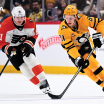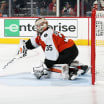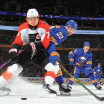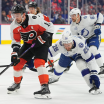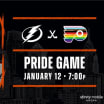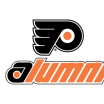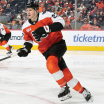Over the years, the Buffalo Sabres may not have been the Philadelphia Flyers' most heated rival at any given time. However, the teams have had several major upticks in animosity toward one another. On an all-time basis in the regular season, the Flyers hold a 92-62-7 record against the Sabres with 20 tie games before the creation of the shootout in 2005. In the playoffs,the Flyers have won six of the nine series played against Buffalo.
Rival in Focus: Buffalo Sabres
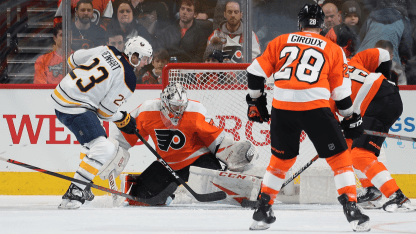
By
Bill Meltzer
philadelphiaflyers.com
The most notable waves of rivalry between the clubs came for several years after the Flyers defeated the Sabres in the 1975 Stanley Cup Final. Things heated up considerably again during the mid-1990s to 2001 when the Sabres had numerous tough guys and agitators in their lineup and the teams met in the playoffs five times in seven years. A third wave of rivalry followed from 2005-06 to 2010-11.
In more recent years, the Sabres have been a struggling team that has missed the playoffs in nine straight seasons. Now, though, the Sabres have been bolstered by some key additions and the club is looking to finish in the top four of the new Eastern Division to return to the postseason for the first time since losing in seven games to the Flyers in the 2011 Eastern Conference Quarterfinal round.
HALL OF AN ADDITION
Even the most casual of hockey fans took notice of the Sabres this fall. On October 11, 2020, the team signed 29-year-old former Hart Trophy (2017-18 season) winner Taylor Hall to a one-year, $8 million contract.
The last two years, partially due to injury in 2018-19 and partially due to falling a little short of expectations following a trade from New Jersey to Arizona last season, were not stellar campaigns for Hall. Nevertheless, he remains an elite talent and figures to make a devastating combination on a line with new teammate Jack Eichel.
Eichel, who had 36 goals and 78 points in 68 games last season before the pandemic abruptly ended Buffalo's season, has begun to live up to his billing as the second overall pick of the 2015 NHL Draft. Likewise, 20-year-old Rasmus Dahlin is a fast-rising star defenseman after the Sabres made him the first overall pick of the 2018 Draft. Sam Reinhart, the second overall pick of the 2014 Draft is now an NHL veteran at the still-young age of 25, and is a bankable 25-goal, 50-point player.
In his first full NHL season during the 2019-20 campaign Swedish right winger Victor Olofsson -- a graduate of the once-prolific Modo Hockey junior system in his native country -- showed a lot of promise. Without much fanfare outside Buffalo, the late-blooming forward notched 20 goals and 42 points in 54 games. The progression has been steady in recent years, too; a breakout season in Sweden's SHL in his final year before coming over, a stellar AHL rookie season for Rochester in 2018-19 and then a very good rookie NHL season for the Sabres.
A longtime thorn in the Flyers' side as a member of the Carolina Hurricanes, Jeff Skinner is entering his third season in Buffalo. His pace dropped off last season but he notched his first career 40-goal season (fourth with 30-plus goals) during his initial year with Buffalo. At age 28, the speedy forward is still in his prime.
The Sabres problem in recent years stemmed from a steep dropoff after the players atop their lineup. The team also needed more leadership. Now there's both more depth and more leadership. This offseason, Buffalo acquired 1,240-game NHL veteran Eric Staal; still a productive player at age 36.
Additionally, the Sabres added some solid depth with the addition of former Dallas Stars and Golden Knights center Cody Eakin. At age 29, Eakin can be a two-way contributor for the Sabres who is still capable of flirting with the prorated (56-game) equivalent of his typical production of 12 to 15 goals and 35 to 40 points when given a top-nine role.
The Buffalo blueline, beyond Dahlin, is not as deep as the forward group. Twenty-seven year old veteran Jake McCabe, entering his sixth full NHL season and eighth pro campaign following his decision to turn pro after his junior year at Wisconsin, is steady if unspectacular. Ditto Colin Miller, entering his second Sabres season and sixth year in the NHL.
Rasmus Ristolainen, now 26 years years of age and entering his eighth NHL season, may have had his development path negatively affected by being rushed to the parent team after the Sabres (at the nadir of their organizational talent pool) selected him with the eighth overall pick of the 2013 NHL Draft. The Finn has tantalized over the years with flashes of high-end play but has often struggled through prolonged bouts of inconsistency. The potential is still there for the right-handed, tall and physically strong blueliner to finally break through once and for all, but the same has been said for the last four or five years.
Twenty-one-year old Henri Jokiharju is entering his second year with the Sabres after the former Chicago first-round pick (29th overall in 2017) came over from the Blackhawks in a trade for Alexander Nylander.
Voorhees native Mattias Samuelsson, the son of longtime Flyers defenseman and current developmental coach Kjell Samuelsson, will turn pro this season after two years at Wester Michigan. He shows promise as a potential future shutdown defender but patience will be needed.
In net, the Sabres split duties last season between Linus Ullmark and former Phantoms goalie Carter Hutton. The tall and athletic Ullmark, now age 27, outplayed his counterpart last year. Both he and the 35-year-old Hutton are back again for the 2021 season. Huge-framed 25-year-old Jonas Johansson, who excelled last year in the AHL for the Amerks and also appeared in six NHL games with the Sabres, is another option. On Nov. 4, 2020, the Sabres signed ex-Phantoms and Montreal Canadiens goalie, Dustin Tokarski. The 31-year-old vet spent last season in the Penguins' organization, backing up Casey DeSmith for the AHL's Wilkes Barre/Scranton club.
Wild card: Pint-sized Finnish import center/winger Artuu Ruotsalainen (whose last name in Finnish, oddly enough, means "Swedish") is a new addition to the Sabres or AHL's Rochester Americans this season after being signed in the spring of 2019. The 23-year-old free agent signing was a top scorer in Finland's Liiga, including 27 points in 19 games this season while on loan from the Sabres to Ilves Tampere during the NHL off-season. It remains to be seen if the 5-foot-8, 180-pound forward's skills translate well to the small-rink game but he's a wizard with the puck.
FLYERS-SABRES SEASON SERIES SCHEDULE
JAN 18: Buffalo Sabres @ Flyers
JAN 19: Buffalo Sabres @ Flyers
FEB 26: Flyers @ Buffalo Sabres
FEB 28: Flyers @ Buffalo Sabres
MAR 9: Buffalo Sabres @ Flyers
MAR 29: Flyers @ Buffalo Sabres
MAR 30: Flyers @ Buffalo Sabres
APR 11: Buffalo Sabres @ Flyers
FLYERS-SABRES RIVALRY HISTORY
The 2020-21 season will mark the first time that the Flyers and Sabres have ever played in the same division as one another.
Entering the NHL as an expansion team in 1970, the Sabres played their earliest years in the oldEastern Division while the Flyers were in the West. For 20 seasons thereafter, the Flyers were a staple of the old Patrick Division, while the Sabres played in the Adams Division. From 1993-94 to 2012-13, Buffalo was then in the Northeast Division when the Flyers were in the Atlantic. Later, after the 2013 realignment of divisions, the Flyers played in the Metropolitan while the Sabres were in the Atlantic. The latter arrangement may return for the 2021-22 season but, at least for one year, the Flyers and Sabres will both compete in the Eastern DIvision and will play each other eight times.
Powered by the "French Connection Line" of Hockey Hall of Famer Gilbert Perrault centering Richard Martin and Rene Robert, the high-scoring Sabres upset favored Montreal in the Stanley Cup semifinals, and advanced to play the defending champion Flyers in the Final. The teams split the first four games, with the home side winning each game including the Sabres prevailing 5-4 in overtime in Game 3 amid a heavy fog blanketing the ice at the sweltering Aud. After the Flyers won a 5-1 decision at the Spectrum at the Spectrum in Game 5, Bernie Parent sealed Philadelphia's second straight championship and his own second straight Conn Smythe Trophy with a 2-0 shutout win in Buffalo in Game 6. Third period goals by Bob "the Hound" Kelly and Bill Clement were all that Parent needed.
The Sabres, who have not won the Stanley Cup in their 51-season existence, would take their second and most recent trip to the Cup Final in 1999, losing to the Dallas Stars (the only Cup in the history of the Minnesota North Stars/ Dallas Stars franchise, which first entered the NHL in 1967 along with the Flyers). Meanwhile, smarting from the loss to the Flyers in the 1975 Final, the Sabres were eager for revenge when they met Philadelphia again in the 1978 Stanley Cup Quarterfinal. Instead, the Flyers prevailed in five games. Bill Barber and Rick MacLeish were the offensive heroes of the '78 series for Philly, while Parent held Buffalo to a combined seven goals over the four Flyers' wins.
Buffalo had their ups and downs in the 1980s, under the direction of the legendary Scotty Bowman, Roger Neilson (later the Flyers head coach) and former Flyers assistant coach Ted Sator. The Flyers, in 1984, hired fiery Mike Keenan -- a Bowman protege who coached Rochester to the Calder Cup championship in 1982-83 -- to be their new head coach. Overall in the 1980s, the Flyers reached the Stanley Cup Final three times (1980 under Pat Quinn, 1985 and 1987 under Keenan) and lost in the Wales Conference Final once (1989 under Paul Holmgren). The Sabres' deepest run in the decade after Bowman took them to the Cup semis in 1980 were trips to the second round in 1981 (Neilson) and 1983 (Bowman).
The Flyers had a five-year lean period of missing the playoffs each season from 1989-90 to 1993-94. The Sabres perennially ducked out in the playoff first round during these years. The rivalry was sparked again starting in 1995, when the Flyers defeated the Sabres in five games in the first round of the playoffs. Without the services of Eric Lindros for the first three games due to a late-season eye injury, Flyers won Game 1 in overtime and then Game 2 in regulation at the Spectrum. Lindros returned for Game 4 in Buffalo as the Flyers took a commanding three games to one lead.
In the deciding game at the Spectrum, Lindros and his Legion of Doom linemates, John LeClair and Mikael Renberg, dominated throughout with their forechecking and cycling game. At one point, Sabres head coach John Muckler called timeout to plead with his players to stop being spectators as the Lindros line did as they pleased. The Flyers ultimately went on advance to the Eastern Conference Final, falling two wins short of a trip to the Cup Final.
The next year, with new head coach Ted Nolan now at the helm in Buffalo, Flyers vs. Sabres games frequently became fight fests. The Sabres of this era featured the likes of Rob Ray, Brad May, arch-agitator Matthew Barnaby and rugged defenseman Bob Boughner to supplement the star power of Pat LaFontaine and goalie Dominik Hasek.
On March 29, 1996 in Buffalo, a game the Flyers ultimately won 6-5 in overtime, a line brawl broke out between the teams. Barnaby lay on the ice, feigning an injury, untl Flyers goalie Garth Snow taunted and poked at him. Barnaby, completely unhurt, then sprung to his feet and attacked Snow, touching off the brawl.
The two teams brawled again the next season in a 1-1 tie in Philadelphia on Feb. 4, 1997. All three members of the "Dan Line" (Scott Daniels, Daniel Lacroix and Dan Kordic) were involved, opposing Buffalo's trio of May, Ray and Wayne Primeau. Flyers defensemen Michel Petit and Chris Therien went up against Boughner and ex-Flyer Garry Galley. Even goalies Snow and Hasek got involved, although future Hockey of Famer Hasek declined a full-blown fight.
The Flyers and Sabres met again in the playoffs in 1997, this time in the second round. Philadelphia again prevailed in five games. Eric Lindros scored a penalty shot goal in the clinching game in Buffalo; by far the most famous play of that series. The Flyers went on to defeat the New York Rangers in the Eastern Conference Final before getting swept by Detroit in the Stanley Cup Final.
There was also yet another Flyers-Sabres brawl; this time in Game 1 of the 1997 playoff series. With Buffalo leading, 2-1, late in the second period, Kordic and Lacroix tangled again with Ray and May as every player on the ice began grappling after a stoppage in play. The situation escalated further, and goalies Snow and Steve Shields fought each other right in front of the Buffalo bench.
The goalie fight seemed to spark the Flyers, who had been struggling up that point.. Renberg scored a goal with 0.1 second left on the second period clock and then Rod Brind'Amour sandwiched a pair of goals (even strength and empty net) around a go-ahead goal by Shjon Podein as the Flyers came back in third period to win the game, 5-3..
The next year, the Sabres got a measure of revenge against the Flyers. Buffalo knocked off the defending Eastern Conference champion Flyers in the first round with a convincing four games to one victory in the series.
There was no Flyers vs. Sabres playoff meeting in 1999, as the Flyers went out in the first round after losing to Toronto. The Sabres reached the Cup Final for the first time since the 1975 series with Philadelphia. Ken Hitchcock's Dallas Stars prevailed in six games, capped off by a highly controversial Brett Hull goal in triple-OT of the deciding game.
In 2000, Philly and Buffalo met in the postseason for the fourth time in six years. The Flyers won the series in five games. This series was most remembered for John LeClair being awarded a second-period goal that tied Game 2 at 1-1, although replays clearly showed that the puck entered through the outside of the netting. By the time NHL officials were able to confirm what happened, it was too late. The Flyers went on to win that game, 2-1,
Philly and Buffalo faced off yet again in 2001. The Sabres won in six games. The clinching game in Buffalo was an agonizing one for the Flyers as Vezina Trophy finalist goalie Roman Cechmanek blew sky high in the first period and the outcome was a foregone conclusion long before the final horn sounded on an 8-0 Buffalo win. The deciding rout is what's most recalled from this series but the series had been hotly contested throughout until the anti-climactic finale.
By the mid-2000s, the Sabres and Senators were frequent tormentors of the Flyers. In 2006, despite the heroics of Peter Forsberg (who almost singlehandedly won Games 3 and 4 in Philadelphia after being instrumental in a comeback during an eventual double-OT loss in Buffalo in Game 1), the Sabres pulled away to win Games 5 and 6 to capture the series. Sabres center Danny Briere had three goals and four assists in the series, including the double-OT goal that won Game 1 in Buffalo.
The Sabres by now appeared to be bonafide Stanley Cup contenders, despite losing in the 2006 Eastern Conference Final to eventual Cup champion Carolina. In 2006-07, the Flyers had the worst season in franchise history.
On Oct. 17, 2006, a struggling Flyers team went into Buffalo to pay the red-hot Sabres a visit. The night was a debacle for Philadlephia after a 0-0 first period. The Sares proceeded to blitz the Flyers for six goals in the second period and three more in the third for a 9-1 slaughter. Upon the Flyers' return to Philadelphia, Hitchcock was dismissed as head coach after three-plus seasons. Bob Clarke resigned as general manager and moved into an advisory role. John Stevens became the Flyers' new head coach and Paul Holmgren became the interim and then long-term general manager.
The Sabres rattled off 113 regular season points in 2006-07, led the NHL in scoring by a wide margin and again reached the Eastern Conference Final. This time, Ottawa defeated the Sabres in five games, including a pair of OT wins for the Senators.
After that season, the two clubs' fortunes began to reverse. The Flyers signed Briere away from the Sabres as an unrestricted free agent and also signed longtime former Sabres goalie Martin Biron (acquired a few months earlier in a trade with Buffalo) to a contract extension. Philly also acquired and signed former Nashville Predators Kimmo Timonen and Scott Hartnell. Buffalo, meanwhile, lost Chris Drury to free agency in addition to Briere.
The quickly rebuilt Flyers went from the worst year in team history to a trip to the Eastern Conference Final the very next year. In 2010, the Flyers reached the Stanley Cup Final for the first time since 1997. The Sabres, meanwhile, began a gradual and ultimately agonizing annual slide from Cup contender status to middle grade club to becoming a long-time struggling team.
The Flyers and Sabres met in the first round of the playoffs in 2011. Buffalo was a banged up team and entered the series against the defending Eastern Conference Champions as the decided underdog. The big difference in the series, though, was goaltending. Buffalo's Ryan Miller recorded shutouts in Game 1 (a 1-0 Buffalo win) and Game 4 (also 1-0), while the Flyers had a goalie carousel that featured three different starters -- rookie Sergei Bobrovsky, veteran Brian Boucher and Michael Leighton -- over the course of the series.
After the Sabres won Game 5 in overtime, they took a three games to two lead in the series. It took a Game 6 overtime tally by Philadelphia's Ville Leino to bring the series back to Philadelphia for a seventh and deciding game. In Game 7, the Flyers dominated from the outset but Miller held the fort until Braydon Coburn broke the scoreless tie in the final 20 seconds of the opening frame.
From there, it was no contest. The Flyers went on to build a three-goal lead by midway through the game and eventually skated off with a 5-2 series clinching win despite a late comeback bid by the Sabres. The series' most memorable moment came on the third Philadelphia goal. After Briere scored on the power play to make it 3-0, he patted former teammate Miller on the back of his head.
After 2011, the Flyers vs. Sabres rivalry cooled down for the remainder of the decade. The Flyers went into retooling mode after 2013-14 for a four-plus year period to rebuild the farm system. Philly reached the playoffs in 2016 and 2018 but lost in the first round. The Sabres have not been back to the playoffs since the loss to the Flyers in 2011.
In 2019-20, the Flyers had a breakthrough regular season under new head coach Alain Vigneault and advanced to the second round of the playoffs. The Sabres showed less dramatic improvement but were a more competitive and deeper club than some of their previous editions in recent history.
On a head-to-head basis, the Flyers went 3-0-0 against the Sabres in 2019-20. Entering the pandemic-shortened 2020-21 campaign, Philadelphia carries a four-game winning streak against Buffalo. Dating back to Feb. 11, 2016, the Flyers are 9-3-0 in their last 12 meetings with the Sabres.

